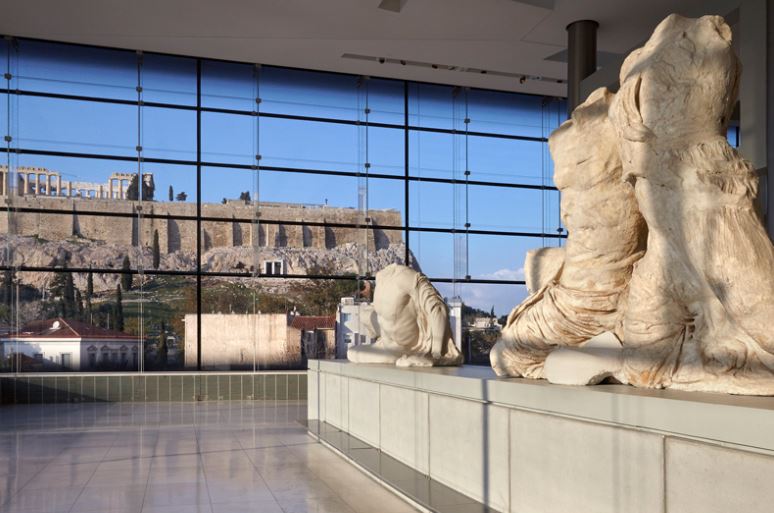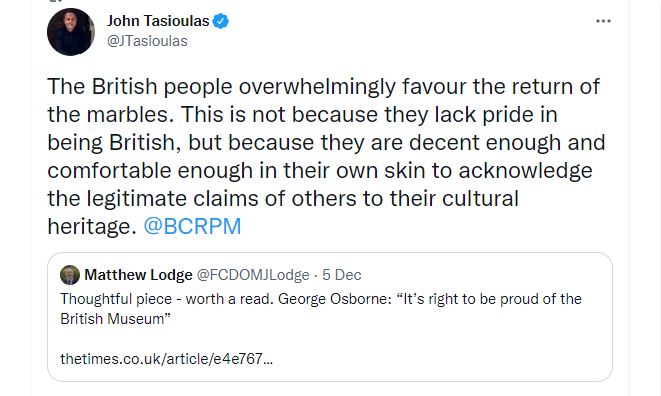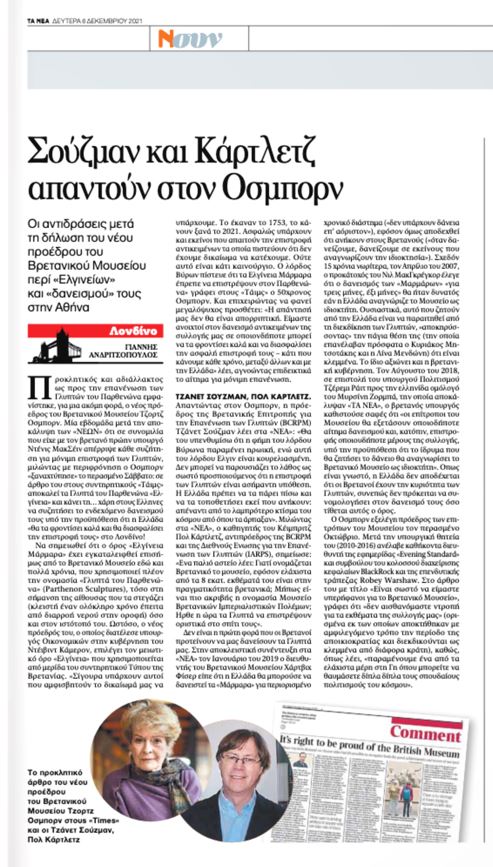The Times, 04 December 2021

The Parthenon Gallery in the Acropolis Musem, Athens, Greece.
George Osborne wrote a Comment piece on page 29 of the Times on Saturday, it was entitled: "It's right to be proud of the British Museum".
He goes on to ask: "Should we be ashamed of Britain’s past or should we celebrate it?"
He adds: " humans are capable of acts of great kindness and appalling brutality towards one another. The artefacts in the British Museum, with their depictions of love and war, reflect that truth over the course of two million years. It is why they help us understand ourselves better. That was the founding purpose when it was established as the first national public museum of the world in 1753, and it remains the purpose today. It was a product less of the British Empire (which was largely created in the following century) and more of the European Enlightenment."
And he does conceed that much has changed in the last 260 years, praising the 'magnificent Norman Foster roof over the Great Court at the Millennium', which he feels helps the British Museum to confidently call itself “the museum of the world, for the world”.
Although he insists that the British Museum is also 'just a museum', and that it cannot resolve the contractions between the Enlightenment as a western construct and universal human rights, or support those that question the very existence of the British Museum.
"Of course, there are those who demand the return of objects they believe we have no right to hold. That is not new either. Lord Byron thought the Elgin marbles should be back at the Parthenon. Our response is not to be dismissive. We are open to lending our artefacts to anywhere and to who can take good care of them and ensure their safe return — which we do every year, including to Greece."
Sadly he suggests that museums of culture ought not shrink in the face of 'culture wars' - why wars and not cultural cooperation? And that the British Museum needs to tell the story of common humanity. Surely common humanity needs to uphold respect for all countries cultural heritage!
To read the full article, follow the link to The Times.
UK Ambassador to Greece Matthew Lodge tweeted the link to George Osborne's article in the Times and John Tasioulas, Director, Institute for Ethics in AI, Faculty of Philosophy, University of Oxford and a member of BCRPM, quoted Ambassador Lodge's tweet:

TA NEA, Monday 06 December 2021
Yannis Andritsopulos, UK Correspondent for Ta Nea writes:
Suzman and Cartledge respond to Osborne
Reactions to the statements made by the new Chair of the British Museum on the reunification of the “Elgin Marbles” and their "loan" to Athens
The new Chair of the British Museum, George Osborne, was provocative and uncompromising on the question of the reunification of the Parthenon Sculptures.
A week after the 'Ta Nea' reported that in a conversation former British Minister, Dennis McShane had with George Osborne, the new Chair of the British Museum rejected any talk of a permanent return of the Sculptures, speaking with "contempt" on the subject. Osborne "struck out once more" on Saturday: in an article in "The Times" where he calls the Parthenon Sculptures "Elgin Marbles" and suggests that Greece discuss the possibility of borrowing them on the condition that Greece could "take good care of them and ensure their return" to London!"
It should be noted that the term "Elgin Marbles" has been officially abandoned by the British Museum for many years. The Museum now uses the name "Parthenon Sculptures", both in the signage of the hall that houses them (closed for a whole year after a water leak from the roof) and on its website.
"Surely there are those who question our right to exist. They did it in 1753, they do it again in 2021. Of course there are those who demand the return of items that they believe we have no right to possess. This is nothing new either. Lord Byron believed that the Elgin Marbles should return to the Parthenon," George Osborne wrote in the Times.
And attempting to appear "magnanimous," he adds: "Our response will not be dismissive. We are open to lending items in our collection to anyone who can take good care of them and ensures their safe return - something we do every year, including with Greece," he says, ostentatiously ignoring the request for permanent reunification of the sculptures.
In response to Osborne, the Chair of the British Committee for the Reunification of the Sculptures (BCRPM), Janet Suzmantells 'Ta Nea': "I will remind him that Lord Byron's reputation remains heroic, while that of Lord Elgin is ragged. He cannot present the error as correct in pretending that the return of the Sculptures is a trivial matter. Greece must take them back and place them where they belong: opposite the brightest building in the world from where they were snatched."
Speaking to 'Ta Nea', Cambridge Professor Paul Cartledge, Vice-Chair of the BCRPM noted: "An old joke says: Why is the museum called British, since very few of the 8 miilion objects held by the BM are actually British-made'. Are the exhibits actually British? Is the name, British Imperial War Museum more accurate? The time has come for the Sculptures to return permanently to their home."
This is not the first time that Britain has proposed to lend Greece the Parthenon Sculptures. In the exclusive interview with 'Ta Nea' in January 2019, the director of the British Museum, Hartwig Fischer, said that Greece could borrow the "Marbles" for a limited period of time ("there are no indefinite loans", he explained at that time), but if Greece accepts that they belong to the Britain ("we lend to those who recognize the ownershiop as belonging to the British Museum ").
Almost 15 years earlier, in April 2007, his predecessor Neil McGregor said that lending the "Marbles" "for three months, six months" would be possible if Greece recognized the British Museum as the legal owner.
Essentially, what they are asking of Greece is to give up its claim to the Sculptures, "renouncing" its long-standing position (recently reiterated by Kyriakos Mitsotakis and Lina Mendoni) that they are stolen.
The British Government is demanding the same. In August 2018, in a letter from Culture Minister Jeremy Wright to his Greek counterpart Myrsini Zorba, published by 'Ta Nea', the British minister made it clear that "the museum's commissioners will consider any request for lending and, subsequently, returning any part of the collection, provided that the institution requesting the loan recognises the British Museum as the owner".
As is well known, Greece cannot accept Britain's ownership of the Sculptures, and will not agree to a loan as long as this condition is set.
Osborne was elected Chair of the Museum in the summer and assumed the post in October. After his ministerial tenure (2010-2016) he assumed the duties of director of the newspaper "Evening Standard" and advisor to the capital management giant BlackRock and investment bank Robey Warshaw.
In his article titled "It is right to be proud of the British Museum", he writes that "we do not feel ashamed of the exhibits in our collection" (some of which were controversially acquired during the colonial period and claimed as stolen by various states), since, as he also states, "we remain one of the few places on Earth where you can admire under one roof, the great civilizations of the world."
To read the Ta Nea article online follow the link here.
